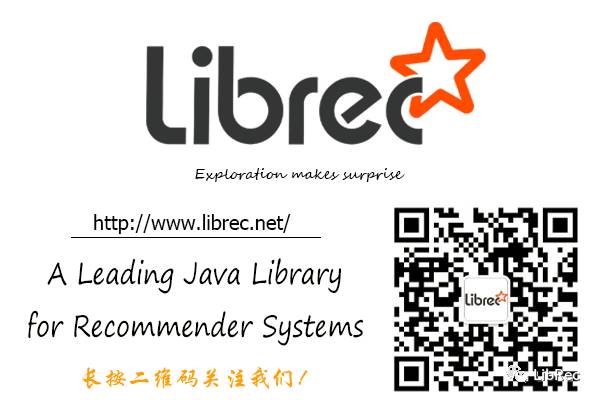LibRec 精选:推荐系统的常用数据集
LibRec 精选
“你一走,这年就算过完了 ...”
【数据集】由Dr. Julian McAuley整理的推荐系统的常用数据集,链接: https://cseweb.ucsd.edu/~jmcauley/datasets.html,收集的数据集包含以下特性:
+ user/item interactions
+ star ratings
+ timestamps
+ product reviews
+ social networks
+ item-to-item relationships (e.g., copurchase)
+ product images
+ price, brand, and category information
+ GPS data
+ other metadata
【技术博客】知识图谱在AirBnb中的应用,链接:https://medium.com/airbnb-engineering/contextualizing-airbnb-by-building-knowledge-graph-b7077e268d5a
【技术博客】用Keras一步步地构建啤酒推荐系统,链接:https://medium.com/data-from-the-trenches/deep-beers-playing-with-deep-recommendation-engines-using-keras-part-1-1efc4779568f?hss_channel=tw-816825631
1. Managing Popularity Bias in Recommender Systems with Personalized Re-ranking
Himan Abdollahpouri, Robin Burke, Bamshad Mobasher
https://arxiv.org/abs/1901.07555v1
Many recommender systems suffer from popularity bias: popular items are recommended frequently while less popular, niche products, are recommended rarely or not at all. In this paper, we introduce a personalized diversification re-ranking approach to increase the representation of less popular items in recommendations while maintaining acceptable recommendation accuracy. We show that our approach is capable of managing popularity bias more effectively, compared with an existing method based on regularization.
2. Multi-Task Feature Learning for Knowledge Graph Enhanced Recommendation
Hongwei Wang, Fuzheng Zhang, Miao Zhao, Wenjie Li, Xing Xie, Minyi Guo
https://arxiv.org/abs/1901.08907v1
We propose MKR, a Multi-task feature learning approach for Knowledge graph enhanced Recommendation. MKR is a deep end-to-end framework that utilizes knowledge graph embedding task to assist recommendation task. The two tasks are associated by cross&compress units, which automatically share latent features and learn high-order interactions between items in recommender systems and entities in the knowledge graph.
3. Thompson Sampling for a Fatigue-aware Online Recommendation System
Yunjuan Wang, Theja Tulabandhula
https://arxiv.org/abs/1901.07734v1
In this paper we consider an online recommendation setting, where a platform recommends a sequence of items to its users at every time period. The users respond by selecting one of the items recommended or abandon the platform due to fatigue from seeing less useful items. We propose a new Thompson sampling based algorithm with expected regret that is polynomial in the number of items in this combinatorial setting, and performs extremely well in practice.
4. AspeRa: Aspect-based Rating Prediction Model
Sergey I. Nikolenko, Elena Tutubalina, Valentin Malykh, Ilya Shenbin, Anton Alekseev
https://arxiv.org/abs/1901.07829v1
We propose a novel end-to-end Aspect-based Rating Prediction model (AspeRa) that estimates user rating based on review texts for the items and at the same time discovers coherent aspects of reviews that can be used to explain predictions or profile users. The AspeRa model uses max-margin losses for joint item and user embedding learning and a dual-headed architecture; it significantly outperforms recently proposed state-of-the-art models such as DeepCoNN, HFT, NARRE, and TransRev on two real world data sets of user reviews. With qualitative examination of the aspects and quantitative evaluation of rating prediction models based on these aspects, we show how aspect embeddings can be used in a recommender system.
5. When Collaborative Filtering Meets Reinforcement Learning
Yu Lei, Wenjie Li
https://arxiv.org/abs/1902.00715v1
To address the problem, we develop a novel and effective approach, named CFRL, which seamlessly integrates the ideas of both collaborative filtering (CF) and reinforcement learning (RL). Further, to achieve collaborative recommendations for the entire user community, we propose a novel CF-based MDP by encoding the states of all users into a shared latent vector space. Finally, we propose an effective Q-network learning method to learn the agent's optimal policy based on the CF-based MDP.
6. RELINE: Point-of-Interest Recommendations using Multiple Network Embeddings
Yannis Manolopoulos, Apostolos N. Papadopoulos, Pavlos Kefalas, Giannis Christoforidis
https://arxiv.org/abs/1902.00773v1
The exploitation of Points-of-Interest (POIs) recommendation by existing models is inadequate due to the sparsity and the cold start problems. In this work, we investigate these problems and present a unified model that jointly learns users and POI dynamics. Our proposal is termed RELINE (REcommendations with muLtIple Network Embeddings).
7. Value-aware Recommendation based on Reinforced Profit Maximization in E-commerce Systems
Changhua Pei, Xinru Yang, Qing Cui, Fei Sun, Xiao Lin, Wenwu Ou, Peng Jiang, Yongfeng Zhang
https://arxiv.org/abs/1902.00851v1
Traditional recommendation targets such as rating prediction and top-$k$ recommendation are not directly related to this goal. In this work, we blend the fundamental concepts in online advertising and micro-economics into personalized recommendation for profit maximization. Specifically, we propose value-aware recommendation based on reinforcement learning, which directly optimizes the economic value of candidate items to generate the recommendation list.
8. Recommender Systems Notation: Proposed Common Notation for Teaching and Research
Joseph A. Konstan, Michael D. Ekstrand
https://arxiv.org/abs/1902.01348v1
In the course of years of teaching and research on recommender systems, we have seen the val-ue in adopting a consistent notation across our work. This has been particularly highlighted in our development of the Recommender Systems MOOC on Coursera (Konstan et al. We present this in hope that it will be useful to others writing and teaching about recommender systems.
9. Heterogeneous Edge Embeddings for Friend Recommendation
Debdoot Mukherjee, Srishti Gupta, Janu Verma, Tanmoy Chakraborty
https://arxiv.org/abs/1902.03124v1
We propose a friend recommendation system (an application of link prediction) using edge embeddings on social networks. Existing network embedding techniques do not leverage signals from different edge types and thus perform inadequately on link prediction in such networks. We evaluate our model on a real-world, active social network where this system is deployed for friend recommendation for millions of users.
10. Understanding Chat Messages for Sticker Recommendation in Hike Messenger
Abhishek Laddha, Mohamed Hanoosh, Debdoot Mukherjee
https://arxiv.org/abs/1902.02704v1
However, discovering the right sticker at the right time in a chat from a large and ever expanding pool of stickers can be cumbersome. In this paper, we describe a system for recommending stickers as users chat based on what the user is typing and the conversational context. We experiment with different approaches to train embedding for chat messages and study their efficacy in learning similar dense representations for messages that have the same intent.






